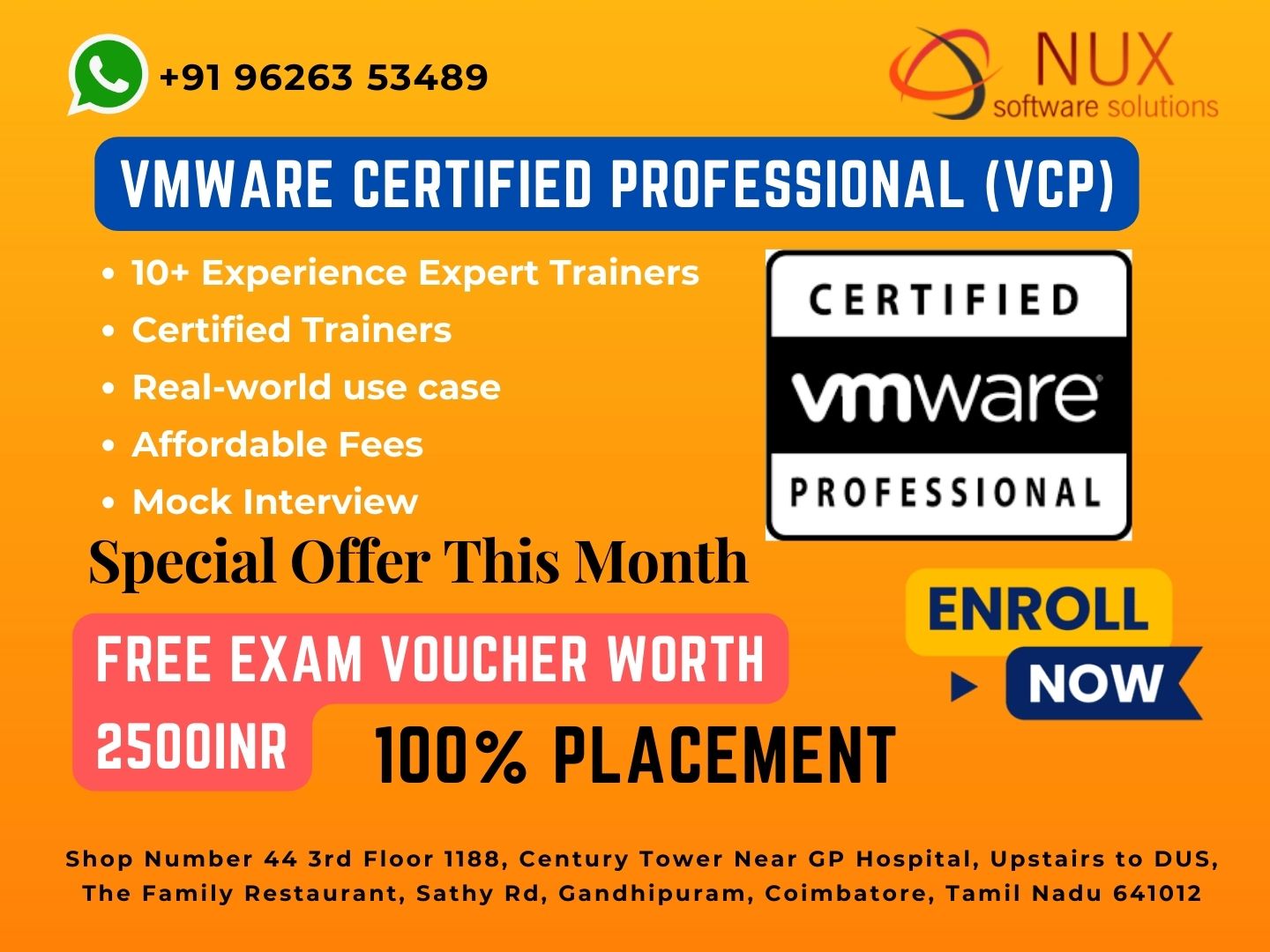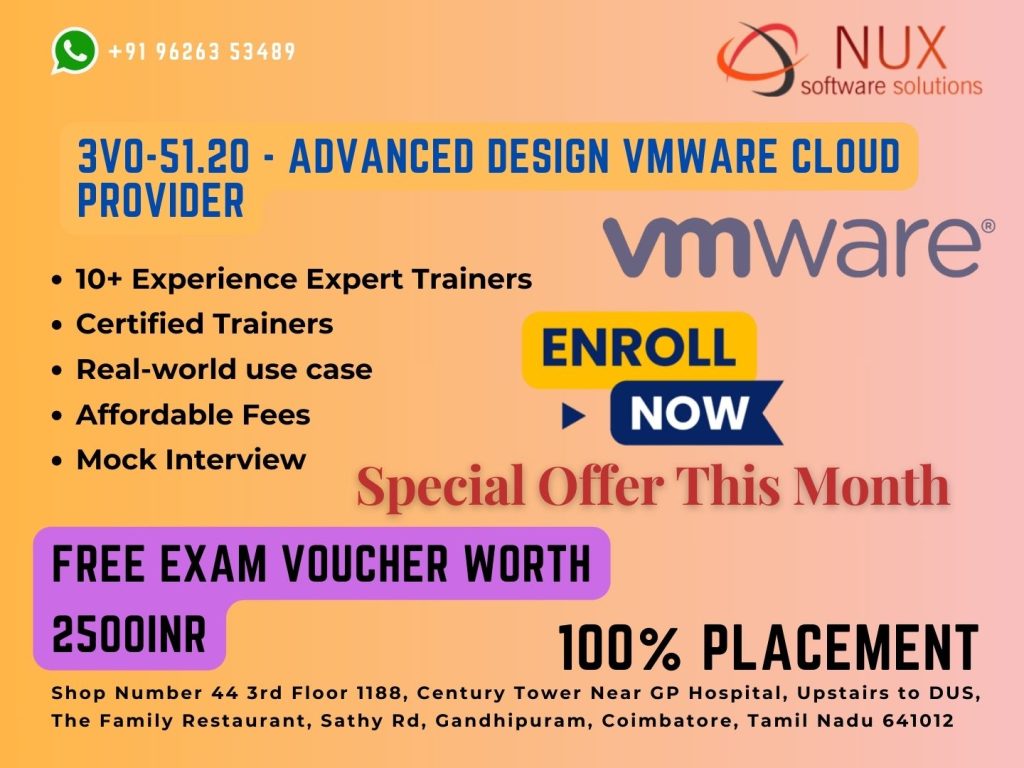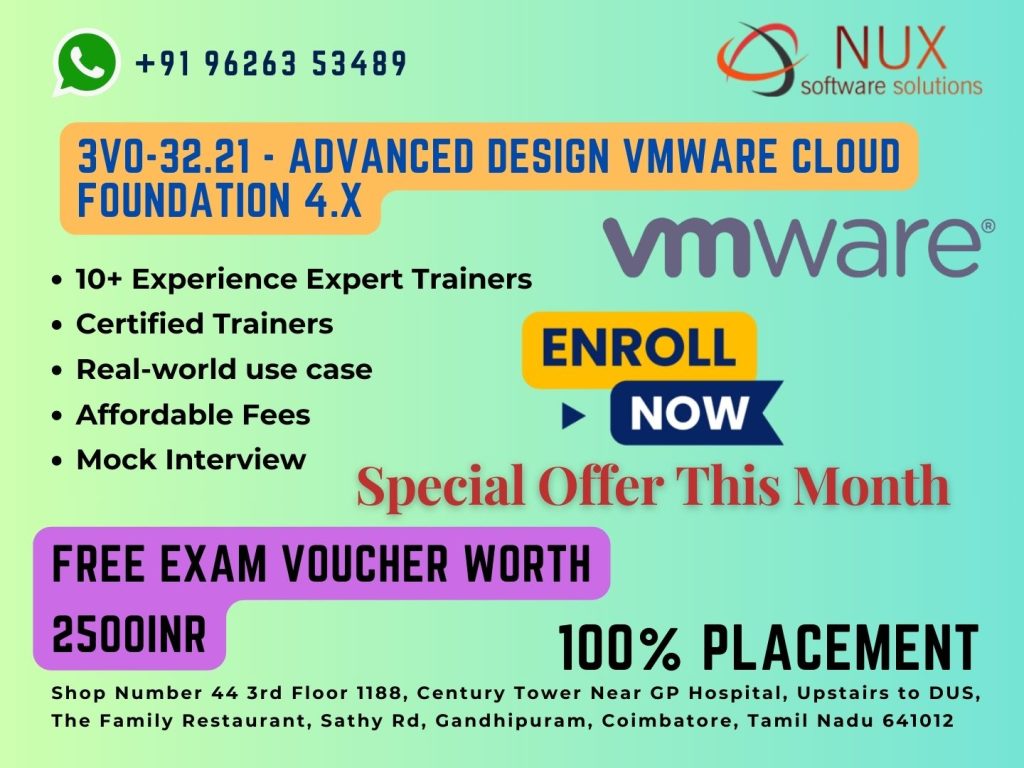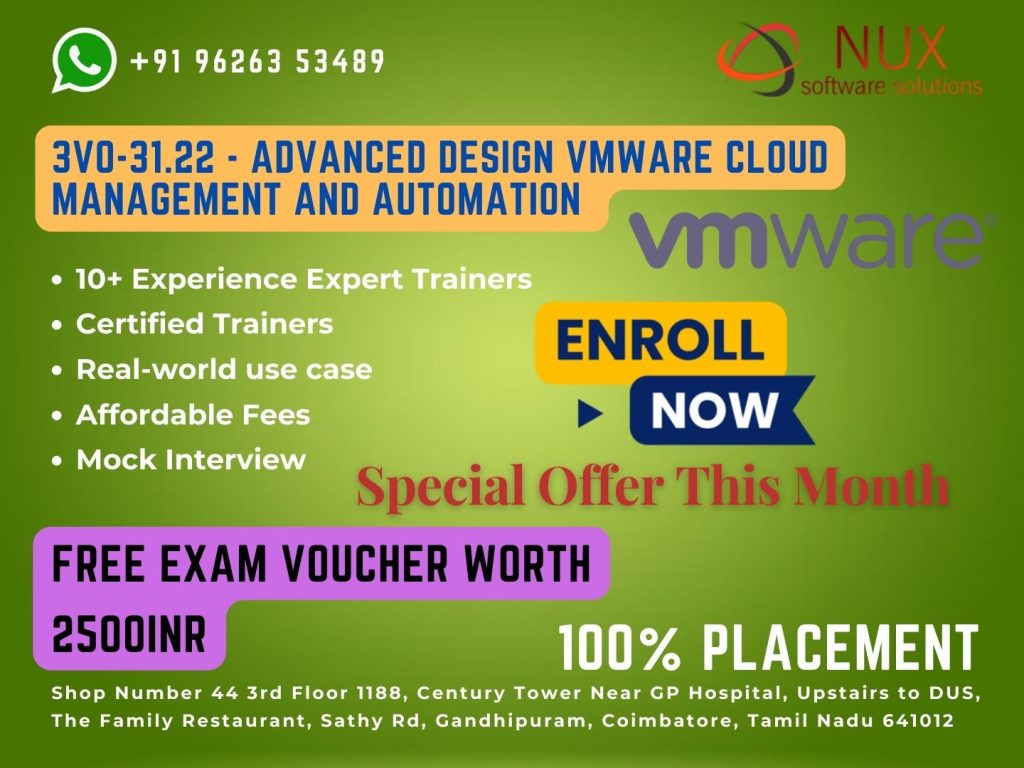VMware Certified Professional (VCP) Training and Certification

Course Overview
The VMware Certified Professional (VCP) certification is the industry standard for virtualization professionals, covering essential skills in deploying, managing, and maintaining VMware environments. This training is ideal for IT professionals working with vSphere infrastructure, and it acts as the foundation for advanced VMware certifications like VCAP and VCDX.
Our VCP training is designed to be hands-on and practical, covering real-world scenarios to ensure learners are confident in installing, configuring, troubleshooting, and optimizing VMware vSphere-based environments.
Tracks are available for VCP specialization areas such as:
VCP-DCV (Data Center Virtualization)
VCP-NV (Network Virtualization – NSX)
VCP-CMA (Cloud Management and Automation)
VCP-DTM (Desktop and Mobility – Horizon)
Why Choose This Course
Globally recognized VMware certification to boost your virtualization career
Learn to work confidently with VMware vSphere, ESXi, and vCenter Server
Prepares you for the official VCP certification exam
Build foundational knowledge required for VCAP and VCDX certification levels
Gain real-world skills in enterprise virtualization, deployment, and management
Who Should Enroll
System administrators and IT operations professionals
Virtualization and cloud engineers
Network or storage professionals working in VMware environments
IT professionals looking to validate their vSphere expertise
Candidates preparing for the VCP exam in any VMware track
Skills You Will Gain
Installing and configuring ESXi hosts and vCenter Server
Managing VMs, templates, snapshots, cloning, and migrations
Configuring and administering virtual networks and shared storage
Ensuring high availability (HA) and resource optimization with DRS
Managing roles, permissions, and secure access control
Performing monitoring, troubleshooting, and vSphere upgrades
Implementing disaster recovery and backup strategies
Career Opportunities
VMware vSphere Administrator
Virtualization Engineer
Systems Engineer – VMware Infrastructure
Cloud Infrastructure Administrator
IT Support Engineer – Virtualization Track
VCP-certified professionals are in demand across industries including banking, healthcare, manufacturing, cloud hosting, and enterprise IT.
Launch Your Virtualization Career with VMware VCP
With the VMware Certified Professional (VCP) credential, you’ll gain the core technical capabilities needed to manage virtualized environments confidently and step into roles that drive digital infrastructure transformation.
Enroll in VMware VCP Training at Linux Training Center, Coimbatore
VMware Certified Professional (VCP) (Foundation) Syllabus
Modules
1. Course Introduction
Introductions and course logistics
Course objectives
2. Introduction to vSphere and the Software-Defined Data Center
Explain basic virtualization concepts
Describe how vSphere fits into the software-defined data center and the cloud infrastructure
Explain how vSphere interacts with CPUs, memory, networks, and storage
Recognize the user interfaces for accessing the vCenter Server system and ESXi hosts
Describe the ESXi host architecture
Navigate the Direct Console User Interface (DCUI) to configure an ESXi host
Recognize ESXi host user account best practices
Install an ESXi host
Use VMware Host Client™to configure ESXi host settings
Describe how to proactively manage your vSphere environment using VMware Skyline
3. Virtual Machines
Create and provision a virtual machine
Explain the importance of VMware Tools™
Install VMware Tools
Identify the files that make up a VM
Recognize the components of a VM
Recognize virtual devices supported by a VM
Describe the benefits and use cases for containers
Identify the parts of a container system
4. vCenter Server
Describe the vCenter Server architecture
Discuss how ESXi hosts communicate with vCenter Server
Deploy and configure vCenter Server Appliance
Use vSphere Client to manage the vCenter Server inventory
Add data center, organizational objects, and hosts to vCenter Server
Use roles and permissions to enable users to access objects in the vCenter Server inventory
Back up vCenter Server Appliance
Monitor vCenter Server tasks, events, and appliance health
Use VMware vCenter Server® High Availability to protect a vCenter Server Appliance
5. Configuring and Managing Virtual Networks
Create and manage standard switches
Describe the virtual switch connection types
Configure virtual switch security, traffic-shaping, and load-balancing policies
Compare vSphere distributed switches and standard switches
6. Configuring and Managing Virtual Storage
Identify storage protocols and storage device types
Discuss ESXi hosts using iSCSI, NFS, and Fibre Channel storage
Create and manage VMFS and NFS datastores
Explain how multipathing works with iSCSI, NFS, and Fibre Channel storage
Recognize the components of a VMware vSAN™ configuration
7. Virtual Machine Management
Use templates and cloning to deploy new virtual machines
Modify and manage virtual machines
Create a content library and deploy virtual machines from templates in the library
Use customization specification files to customize a new virtual machine
Perform vSphere vMotion and vSphere Storage vMotion migrations
Describe the Enhanced vMotion Compatibility feature
Create and manage virtual machine snapshots
Examine the features and functions of VMware vSphere® Replication™
Describe the benefits of VMware vSphere® Storage APIs - Data Protection
8. Resource Management and Monitoring
Discuss CPU and memory concepts in a virtualized environment
Describe what overcommitment of a resource means
Describe methods for optimizing CPU and memory usage
Use various tools to monitor resource use
Create and use alarms to report certain conditions or events
9. vSphere Clusters
Describe the functions of a vSphere DRS cluster
Create a vSphere DRS cluster
Monitor a vSphere cluster configuration
Describe options for making a vSphere environment highly available
Explain the vSphere HA architecture
Configure and manage a vSphere HA cluster
Examine the features and functions of VMware vSphere® Fault Tolerance
Describe the function of the vSphere® Cluster Service
10. vSphere Lifecycle Management
Recognize the importance of vCenter Server Update Planner
Describe how VMware vSphere® Lifecycle Manager™works
Describe how to update ESXi hosts using baselines
Validate ESXi host compliance using a cluster image
Describe how to upgrade VMware Tools and VM hardware



